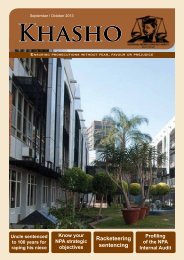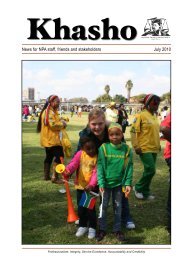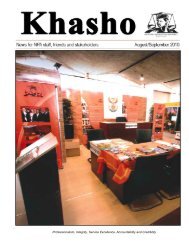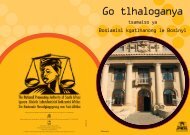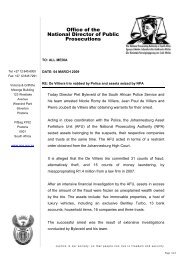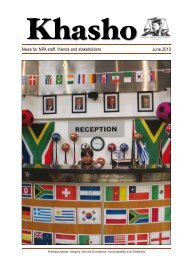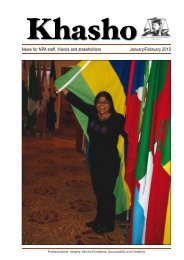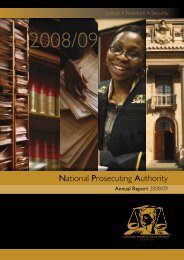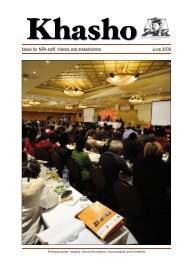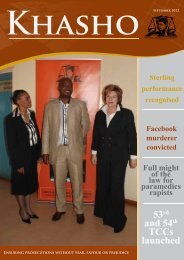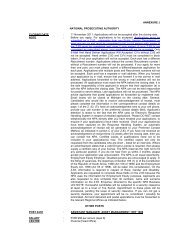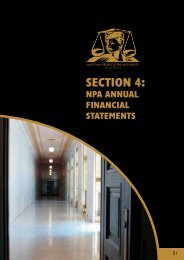Khasho November December 2011 - National Prosecuting Authority
Khasho November December 2011 - National Prosecuting Authority
Khasho November December 2011 - National Prosecuting Authority
Create successful ePaper yourself
Turn your PDF publications into a flip-book with our unique Google optimized e-Paper software.
Judge Legodi Visits the NPA<br />
Tebogo Seate<br />
NPA PERFORMANCE<br />
Judge Legodi (centre) with Adv Patricia Dipuo Makroti (right) and<br />
Adv Rufus Kwaile Malatji<br />
On 17 <strong>November</strong> <strong>2011</strong>, the Legal<br />
Affairs division of the NPA invited<br />
Judge Frans Legodi to share critical<br />
information about how prosecutors are<br />
viewed by the judiciary. Judge Legodi is<br />
currently serving as a Judge in the Pretoria<br />
High Court, and has also been appointed by<br />
the President to the Commission of Enquiry<br />
into the arms deal.<br />
Judge Legodi acknowledged that the<br />
courts and prosecutors complement one<br />
another in the fight against crime. He said,<br />
“Prosecutors have a role to play in society<br />
and that will never be taken away from them<br />
because it is entrenched in the Constitution.<br />
Prosecutors exist because crime will never<br />
stop; police will never stop investigating<br />
crime and members of society will never<br />
stop reporting crime.” Judicial officers, on<br />
the other hand, are there to make decisions<br />
on matters presented to them in the courts<br />
by prosecutors, and these decisions must be<br />
just and impartial. He said prosecutors have<br />
a critical role to play in assisting judicial<br />
officers and the courts in general in making<br />
such decisions.<br />
He urged prosecutors to continue doing<br />
their jobs fearlessly and without favour or<br />
prejudice, because members of society will<br />
only continue reporting crime if they have<br />
confidence that prosecutors will continue<br />
prosecuting successfully.<br />
Judge Legodi said judges are very<br />
impressed by prosecutors who do thorough<br />
preparations and research before a matter<br />
is presented in court. He said although<br />
prosecutors in general were doing excellent<br />
work, bad apples still existed in the NPA<br />
which spoiled all the good ones.<br />
He said, “Lack of preparation by prosecutors<br />
brings the NPA into disrepute. Prosecutors<br />
made a promise to serve the nation. If they<br />
fail to do this, not only do they fail themselves<br />
but the whole nation as well. Every day when<br />
I wake up, I look forward to the day because<br />
I have made a promise to serve the nation.<br />
I therefore urge all prosecutors to have the<br />
same attitude”.<br />
At the end of his presentation, prosecutors<br />
were also given the opportunity to ask<br />
questions. Below are highlights of the Q&A<br />
session:<br />
Why are foreigners easily granted bail by<br />
the high courts<br />
Every matter is decided on its facts. Judges<br />
are guided by what is presented to them<br />
by both prosecutors and the defence. I’m<br />
therefore hesitant to say that this is a general<br />
trend in our courts.<br />
How easy is it for a judge to remain<br />
impartial, fearless and independent<br />
It is easy – and the only way to assess that<br />
is by looking at his/her judgment. At the end<br />
of the day, judges remain accountable and<br />
answerable to the people they serve. My<br />
attitude is that we learn from one another on<br />
a daily basis.<br />
How many times can a judgment be<br />
reserved and for how long<br />
It is part of a work ethic to ensure that a<br />
reserved judgment is delivered as quickly<br />
as possible. It is the delay in the delivery<br />
of judgment that brings down the judiciary.<br />
What happens when a judge has a<br />
tendency to reserve judgments<br />
It is considered gross misconduct. It is<br />
generally not a good practice, but different<br />
judges have different reasons for doing<br />
so. However, what society expects is for<br />
judgments to be delivered as expeditiously<br />
as possible.<br />
Language barriers are still a problem<br />
in our courts. What is being done to<br />
address this<br />
Language is indeed still a problem because<br />
of the demographics of this country – but<br />
no one should be excluded from court<br />
proceedings because of language.<br />
Do judges consult one another<br />
Yes, they always consult one another<br />
for advice, especially on matters that are<br />
difficult to decide.<br />
What is your view on restorative<br />
justice<br />
It is important to involve victims of crime<br />
before sentencing. It is high time we<br />
give it a serious thought; but it has to be<br />
initiated by prosecutors.<br />
PROFESSIONALISM, INTEGRITY, SERVICE EXCELLENCE, ACCOUNTABILITY AND CREDIBILITY<br />
7



